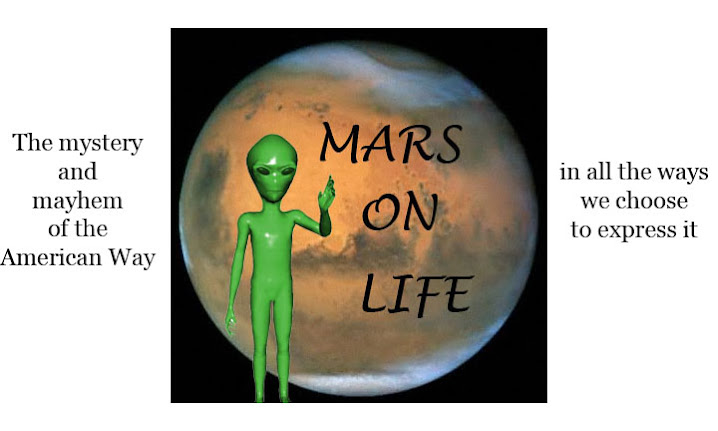
Four years after its final episode, Sex and the City opens as a feature film on May 30th. The movie was a long time in the making due to alleged squabbling on the part of Kim Cattrall, who plays Samantha. What is it with Sex and the City? It had a strong six-year run on cable television, where it was allowed to utter deliciously dirty words and refer to sexual practices your mother would probably find unspeakable. But then you found out that your mother was a fan of both the show and the practices and you realized that what Sex and the City offered was the chance for a revealing dialogue among and about women.
Even though the core premise of the show was the romantic pursuits of four upwardly mobile urban females, it was the openness of communication to which viewers responded. Here were women who discussed their sex lives as easily as if they were drink recipes. Bottoms up! This wasn't American television, was it? Backwards American television, finally (verbally) catching up to things German TV had been broadcasting for years and openly appearing to enjoy it?
Sex and the City's protagonists--Carrie, Miranda, Samantha, Charlotte--lounged about Manhattan like odalisques waiting for a king's summons, while at the same time being empowered and independent modern females. This was the central conflict and one that had some of its roots in The Mary Tyler Moore Show. Mary Richards set the precedent for women as self-supporting and self-sustaining creatures, but the SATC cast gave this prototype a Cosmopolitan, a vibrator, and a revolving-door sex policy.
What Mary Richards did not transact was the type of sexual negotiation that has always lurked about romantic couplings and how defenseless women can be in the face of it. The show asked not that we ourselves participate or even approve, but that we at least admit that these situations exist in all their potential awkwardness and that they are a normal part of day-to-day living. It explored the intricacies of strategy and how people navigate the uncomfortable spaces between them.
Most of all, though, Sex and the City was about what lies under the skin. Each character wore her vulnerabilities like accessories, even (or especially) a character as aggressive and blithely outspoken as Samantha. Despite their sophistication, they often found themselves muddling through to whatever constituted a personal happy ending. And then it didn't really end so much as it did leave the door open for the jump to the big screen.
This was dressed in the sort of Manhattan hoplite wardrobe required for venturing onto that city's chic battlefields. The fight to get a latte and the skirmish over a restaurant table were never so stylishly outfitted. Never mind that there was a waiting list for a certain pair of cargo pants; Carrie Bradshaw would be among the first to wear them. Carrie, as played by Sarah Jessica Parker, exemplified what Carmel Snow called "hard chic." As the editor of Harper's Bazaar in the 1930s, Snow promoted a look where an angular, tough chic substituted for beauty. Snow felt that the interesting thing about a woman was not in softness of feature but in spareness of frame and how clothing rode jutting hipbones. As a collage of style edicts, Parker wore the designer closet magnificently. Manhattan, or at least the Manhattan of television, had never looked so stylistically spontaneous.
The Manhattan of Sex and the City is a behavioral foundation rather than it is a place. "I'm a New Yorker!" Carrie exclaims, as if that should explain everything. It does and it doesn't. Why, for instance, would anyone choose to pay $2,500 a month for a small one-bedroom apartment? Or sacrifice personal safety for a trendy zip code and zesty ethnic food?
Also, New Yorkers are not the only ones who have multiple sex partners. This is done everywhere, although it might be a bit absurd to offer as mea culpa the state of being from Detroit.
Saying one is a New Yorker is not like saying one is from anywhere else, except maybe Paris. Carrie's exclamation is the equivalent of a Gallic shrug. From the beginning, it was made clear that New Yorkers lead more glamorous lives than the rest of us, even if they pay through the nose to do so. The city itself gave off an energy and an excitement that demanded a disengagement from rational thought, something Carrie would encounter when purchasing shoes became more important than paying rent.
From the looks of the trailer, the movie promises more logocentric costuming and some egocentricity on the part of Carrie, who has overplanned her wedding. For whatever reason, the dialogue suddenly sounds corny ("I let the wedding get bigger than Big"), but then you realize that what you remember about Sex and the City was not the way that Parker delivered such bromides with a straight face. Instead, you remember how exquisite things can be when they are lopsided and arbitrary.
Wednesday, April 2, 2008
More Sex, Please
Labels:
Sex and the City movie
Subscribe to:
Post Comments (Atom)









11 comments:
'Lopsided and Arbitrary' would be a good way of putting it.... I love how you've touched upon the flaws of SATC but then in the end, I'm thinking you conclude that these flaws make it sort of good...
Angular chic is exactly how I'd describe SJP too...
First of, let me tell you I once more utterly enjoyed the reading of your superb prose. The progression of the text is just perfect.
Then, I have never been a big SATC fan and I have to say the very few times I have seen it I was struck by that open sex-talk in it, it was a mixture of funny and discouraging to me. However, I am somehow looking forward to watching the film, mostly because of the styling.
xx
My dirty little secret: I hated SATC. Not for prudish reasons, but I never found any of the four characters compelling or interesting, although I admit to a certain delight at the outrageous concoctions of P. Field.
My dirty little secret: I hated SATC. Not for prudish reasons, but I never found any of the four characters compelling or interesting, although I admit to a certain delight at the outrageous concoctions of P. Field.
Once when a stalker physically accosted me on the street in Rome (he grabbed me by the arm after following me for ages; it definitely wasn't one of those cute "oh, Italian men are just like that" things), I shrieked, "Screw you, I'm from New York!" and he finally ran off. I didn't plan it or anything, it just came out!
lovely post. it's really refreashing to hear someone have a more realistic and thoughtful opinion of the show. at the time, i was amazed because i never seen anything like it, and it did touch upon some issues even us less glamourous single urban women go though.
As the movie release date approaches I have noticed many people coming out of the woodwork to exclaim that they have "always disliked SATC." Before I had seen an episode I had largely thought the same thing. Then I watched one, and the rest, as they say, is history.
To echo the S's collective comments - the show is such that its flaws do not detract from it, but rather give it most of its charm. These women are not, in my mind, meant to be role models (and really, why do we keep demanding characters that we like? Do we really want a world of Everybody Loves Raymond 24hrs a day? Oh wait - that world has already happened.)
I am definitely going to watch the movie, and in anticipation will be reviewing seasons 2-7 again.
I am finding that I'm always one comment behind TBW when I visit blogs. But it won't stop me.
I was late coming to SATC, but I'll admit that as soon as I found it, I fell hard. I still watch and re-watch episodes. It's as you said: it isn't about relating to the personalities of the 4 ladies, but it is about connecting to their open-ness.
Although the styling behind the show and the way NY is framed is all fiction, it's also an inspiration for me to inject a little more colour and spontaneity into my outfits and my attitude, even if I don't live in the Big Apple or get invited to Prada parties.
After watching an episode, I always feel excited about my wardrobe again, even if an hour ago I swore I had nothing to wear ever again. It's about being bold enough to add glamour and romance into the everday. The fact that doing so may be inconvenient or ridiculous, as fashion and life often are, is what makes it worth while.
ms. mars-
Again you have my read my thoughts. I am no die hard SATC fan, but I do enjoy the show. When my male friends put the show down and stereotype the viewers as a bunch of insipid college girls in their pajama's sipping on cosmos, I have always stuck up for it. The bottom line is the show was successful because out of the four women in the show, most women can relate to one. And they watch that women say all the thinks they think, and may not be able to say. And the truth of the matter is, when women are with their closest friends, they talk like that. I believe that through centuries of female oppression we still subconsciously hold on to some of those ideals, and we feel embarrassed when we let our selfs go. SATC patted women on that back and told them they weren't the only ones. Thats why the show was so successful. All it is was honest writing.
Wonderful post. I'm looking forward to the film but find it hard to get my head around the fact that Carrie is getting married...
Ah you write so well! You totally summe up what I love about SATC, the characters are flawed and ditzy and messed up but it works.
Post a Comment